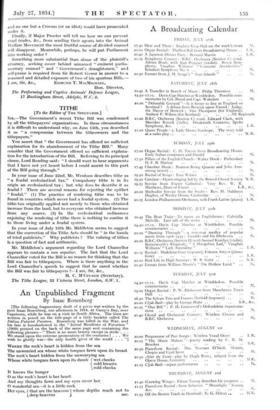TITHE [To the Editor of THE SPECTATOR.] SIR,-The Government's recent
Tithe Bill was condemned by all the tithepayers' organizations. In these circumstances it is difficult to understand why, on June 15th, you described it as " a compromise between the titheowners and the tithepayers."
You assert that " the Government has offered no sufficient explanation for its abandonment of the Tithe Bill." Many consider that the Government offered no sufficient explana- tion for the introduction of the Bill. Referring to its principal clause, Lord Reading said : "I should want to hear arguments that I have not yet heard before I could assent to this part of the Bill going through."
In your issue of June 22nd, Mr. Wenham describes tithe as " a feudal ecclesiastical tax." Compulsory tithe is in its origin an ecclesiastical tax ; but why does he describe it as feudal ? There are several reasons for rejecting the epithet " feudal." (1) The practice of rendering tithe was to be found in countries which never had a feudal system. (2) The tithe-tax originally applied not merely to those who obtained increase from the land, but to everyone who obtained increase from any source. (3) In the ecclesiastical ordinances enjoining the rendering of tithe there is nothing to confine it to those living under a feudal system.
In your issue. of July 13th Mr. Middleton seems to suggest that the correction of the Tithe Acts should be " in the hands of tried publicists." Why publicists ? The valuing of tithes is a question of fact and arithmetic.
Mr. Middleton's argument regarding the Lord Chancellor appears to contain a non sequitur. The fact that the Lord Chancellor voted for the Bill is no reason for thinking that the Bill was fair to tithepayers. Where is there anything in the Lord Chancellor's speech to suggest that •he cared whether the. Bill was fair to tithepayers ?-I am, Sir, &c.,


































 Previous page
Previous page